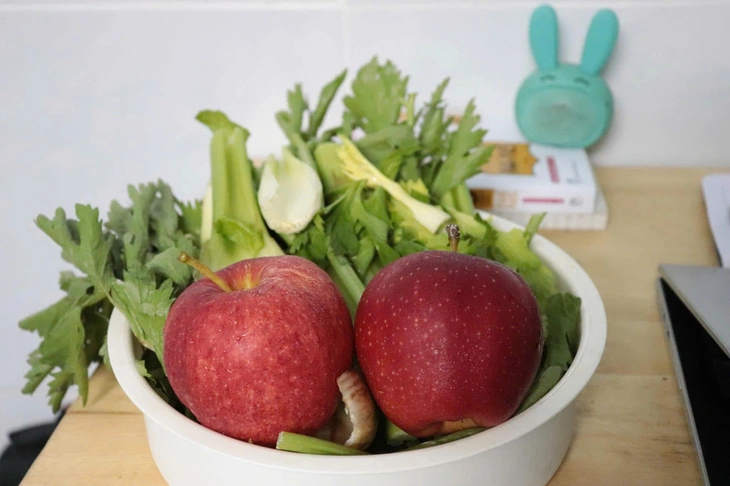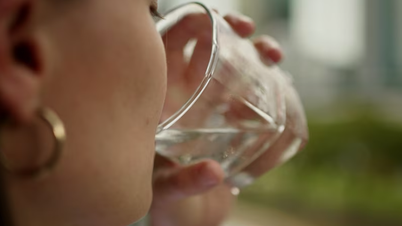
Celery and apple - Photo archive
Currently, information is spreading on the internet that after many days of eating celery, the sperm count of men decreases significantly, even to the point where it is difficult to conceive. However, after a few weeks of stopping eating celery, the normal condition is restored.
Does eating a lot of celery reduce sperm count and make it difficult for men to have children?
Some studies show that celery affects sperm.
Dr. Le Thi Thu Ha (Tu Du Hospital, Ho Chi Minh City) said that celery (Apium graveolens) is a popular spice vegetable, and is also used in traditional medicine with many physiological effects.
Scientifically , some studies show that celery has an effect on sperm, but the effect depends on the dose, duration of use, and research context.
Specifically, celery contains flavonoids and vitamin C, which help reduce oxidative stress - one of the causes of sperm damage. Some animal (mice) studies show that low-medium doses of celery extract can increase sperm count and motility...
Some studies have shown that when used in high doses for a long time, celery extract reduces sperm count and causes damage to testicular tissue (in rats). Celery can inhibit pituitary-testicular activity if used in excess.
Doctor Nguyen Kim Ngan (Examination Department, Ho Chi Minh City Hospital of Traditional Medicine) explained that celery contains apigenin - a natural flavonoid with antioxidant and anti-inflammatory properties and the potential to affect the central nervous system.
However, when used in high doses or for a long time, apigenin can inhibit spermatogenesis and affect testicular structure. Some animal studies have shown that consuming large doses of celery can reduce testosterone levels and affect spermatogenesis.
Some animal studies have shown that phthalides found in celery can inhibit sperm production and alter male sex hormone activity, causing hormonal imbalances or affecting the function of Leydig and Sertoli cells in the testicles.
Similarly, coumarin found in celery also has Indirect effects on the sex hormone axis because the liver is the organ that metabolizes sex hormones.
In addition, essential oils (d-limonene, selinene, myrcene...) create a characteristic aroma, have antibacterial and antioxidant activities. Some essential oil components at high doses can cause testicular toxicity - mainly through oxidative stress or changes in sperm cell membranes, which can reduce sperm density and motility.
Celery contains small amounts of phytoestrogens - estrogen-like substances. In high doses or long-term use, these substances can cause hormonal imbalances, leading to decreased testosterone production, decreased libido and decreased sperm count.
Should diversify the diet
"Currently, there is no clear evidence that eating celery at normal levels (less than 100 - 200 grams of fresh celery/day) is harmful to male fertility. However, animal studies show that using high doses of celery extract can affect the reproductive endocrine system and sperm quality," Dr. Kim Ngan informed.
Other substances such as essential oils, phthalides, and phytoestrogens have not yet had clear harmful doses in humans.
Thus, it can be seen that only when using celery in very high doses, continuously, there is a risk of affecting male reproductive function. However, repeated use of a food, even if benign, for a long time is not recommended.
You should diversify your diet to limit the accumulation of potentially harmful substances and supplement other nutrients.
Dr. Thu Ha recommends that moderate use of celery can be good for sperm, thanks to its antioxidant properties. Do not abuse high doses, especially concentrated extract products.
Safe use recommendations for celery
Celery should be used 2-3 times a week. If you eat fresh vegetables, you should eat 100-200gr each time.If drinking juice, about 400 - 500 grams can be squeezed into 200 ml of juice. Avoid using celery in combination with drugs/chemicals that affect hormones.
People with reproductive problems should not use celery in large amounts and continuously.
In addition, drinking celery juice for many days can lower blood pressure quickly, people with low blood pressure should pay attention. It is recommended to eat celery for fiber rather than just drinking celery juice.
Be careful in cleaning celery before juicing to limit digestive disorders, worm infections...
Source: https://tuoitre.vn/nam-gioi-an-can-tay-nhieu-co-bi-giam-tinh-trung-va-kho-sinh-con-20250614102328274.htm



























![[Photo] The 9th Congress of the Party Committee of the Office of the President, term 2025-2030](https://vphoto.vietnam.vn/thumb/1200x675/vietnam/resource/IMAGE/2025/6/20/78e7f27e8c4b4edc8859f09572409ad3)

























![[Maritime News] Wan Hai Lines invests $150 million to buy 48,000 containers](https://vphoto.vietnam.vn/thumb/402x226/vietnam/resource/IMAGE/2025/6/20/c945a62aff624b4bb5c25e67e9bcc1cb)











































Comment (0)